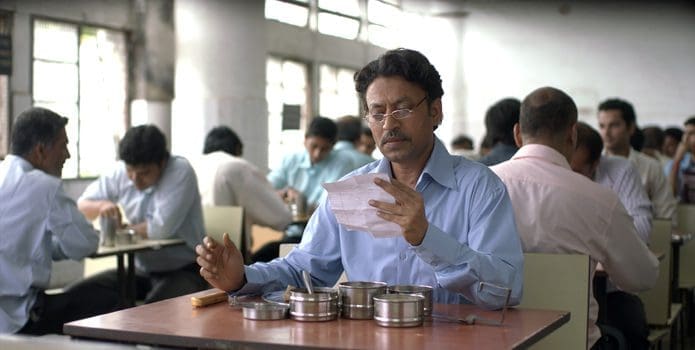
“The way to a man’s heart is through his stomach.” (I beg to differ from the gender bias present in this idiom. Why can’t a woman’s heart be reached through her stomach rather than a diamond ring?) Although this is horribly incorrect medically, it does make one smile when it is played out in this humble movie called “Lunch Box.” The layers of food that eat away at an old man’s heart and a young woman’s soul is portrayed delicately like a loose thread lying somewhere in the middle of a busy Mumbai local train. The amount of subtext present in between each ‘dabba’ is endless; every object from the lunch box, to the ceiling fan, to the written messages scribbled on wet papers has colossal significance in conveying the ultimate message of finding order in chaos.
The central setting of the movie is the Mumbai local train in which lies the success of the dabbawallas efficiency. The dabbawallas in Mumbai are known to make only one mistake in six million deliveries. The director, Ritesh Batra, cleverly expresses how even that one ‘mistake’ can turn into a beautiful story. Rather than turning it in to a chaotic mistake of a wrong lunchbox reaching the wrong place at the wrong time, he turns it in to an orderly fragile love story that helps two human beings to grow in their respective chaotic lives. Saajan Fernandez, an almost retired accountant, a widow, who has spent 35 years of his life is lonely and expects the least out of his life. Until, he tastes the loving, spicy, desperate- for- attention- from- her- husband, food from a neglected housewife, Illa. The meeting of scrumptious food in a hungry man’s mouth inevitably begins a short optimistic love story which provides excitement in their respective lives. The anxious wait for his lunch box on his table and the immediate inhalation of the food gave him the happiness that he lacked for so many years. While the stainless lunchbox returned to her gave her the appreciation she needed for so many years. In their busy monotonous life style they both find a sense of calmness over food.
The next step of prolonging the satisfaction provided by the food is the exchange of written messages. It starts from his criticism that the food was a little too salty. Confused and a little angry, her aunty upstairs hands her down chillies to retaliate to his criticism. These written messages are a rebellious act against the highly wired chaotic technology world. It is a clean break from the emoticons and misunderstandings sent over a text to the simple words (like how about I come to Burma with you?) written with a pen in cursive handwriting. Batra gives the audience a break from the fast paced world where two people can now marry over the internet and takes us back when everything was slower and a wait for a letter was always cherished.
Batra also emphasizes how two souls don’t have to see each other to have a connection or to follow an advice. Without meeting each other, Saajan gives Illa an advice to make another baby with her husband, maybe then she might be happy. Illa does try to follow it but alas remains neglected by her husband (despite wearing a seemingly black bra under her white kurta). She again sinks into her depression and narrates the suicidal story of a woman who jumped off a building with her child to Saajan. In today’s world having such an intimate conversation with a stranger will be questioned and gawked at but across messages in a lunchbox the chaos calms and seems justified.
Although the characters find excitement in knowing each other, they both face their monotonous life and this is symbolized by the ceiling fan, when Illa describes the ceiling fan that Aunty’s comatose husband keeps on staring at continuously. Although a fan continuously moves above Aunty’s half dead husband, he finds that consoling because as soon as the fan stops because of load shedding, he closes his eyes. Since then Aunty got a generator so that her husband can keep on staring at it. Although a humorous and an absurdist aspect is seen in this ceiling fan, it symbolizes how one continuously rotating ceiling fan can give a sense of an order to a dormant man. (God knows what thoughts that old man must be having).
The beauty of this story is that it is one of those rare love stories where the audience will want an old widowed man to remarry a young married woman. The audience longs for them to meet but they end up going on the wrong tracks and lose each other in the orderly dabbawalla system. The audience is left to ponder whether another mistake will lead them to be together again or was this only a lunchbox affair that they both forget. The movie just leaves you hungry for more, may it be their union, their happiness or the food.

Be the first to comment